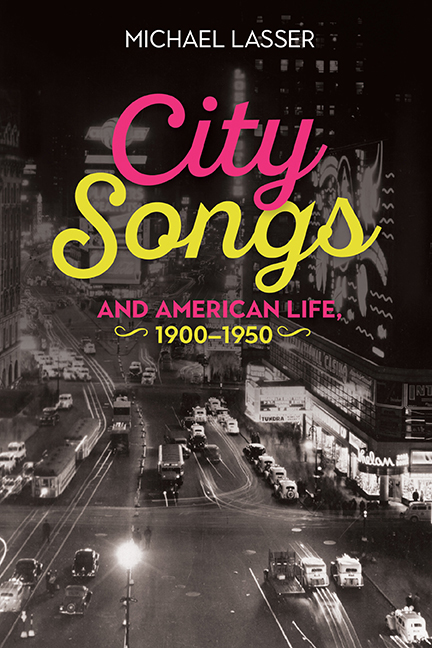Book contents
- Frontmatter
- Dedication
- Epigraph
- Contents
- Notes to the Reader
- Introduction: Encountering the City
- 1 The City's Clangor
- 2 Broadway's Melody
- 3 Harlem's Renaissance
- 4 Recordings, Radio, and Talkies
- 5 Starting the Century
- 6 The Flapper and the Jazz Age
- 7 The Great Depression
- 8 World War II
- Afterword
- Notes
- Bibliography
- Miscellaneous Endmatter
1 - The City's Clangor
Published online by Cambridge University Press: 31 August 2019
- Frontmatter
- Dedication
- Epigraph
- Contents
- Notes to the Reader
- Introduction: Encountering the City
- 1 The City's Clangor
- 2 Broadway's Melody
- 3 Harlem's Renaissance
- 4 Recordings, Radio, and Talkies
- 5 Starting the Century
- 6 The Flapper and the Jazz Age
- 7 The Great Depression
- 8 World War II
- Afterword
- Notes
- Bibliography
- Miscellaneous Endmatter
Summary
In a 1948 essay entitled “Here Is New York,” E. B. White, the longtime writer for the New Yorker, wrote that “the island of Manhattan is without any doubt, the greatest human concentrate on earth, the poem whose meaning will always remain elusive.” But what if White got it wrong? What if Manhattan were a song instead of a poem, and a popular song at that? Nothing too artsy, mind you, but something jump-started and driven by Tin Pan Alley's grit, Harlem's sensual syncopation, and Broadway's gaudy pizzazz. Add to that an ear fine-tuned to the tough, funny way New Yorkers used to talk, plus the gift that good lyricists had for lifting that snappy talk through imagery and rhyme to woo and seduce in a million irresistible songs. This cultural inbreeding stands on the twin ironies of syncopation, which came initially from African American music, and the conversational lyric, devised mainly by Irish and Jewish songwriters. At the risk of oversimplification, you might even say that without the children of slaves and castoffs, America would have no sound of its own.
More often than not, the Great American Songbook is upbeat and optimistic. This is remarkable when you consider that the blues, ragtime, and jazz contributed to shaping the Songbook between 1900 and 1920—especially because all three were the musical release of oppressed peoples. Thomas Jefferson had promised Americans the right to pursue happiness, but Tin Pan Alley songwriters had only thirty-two bars to make the point. So Ted Koehler's lyric urges you to set your cares and troubles aside and be happy (Harold Arlen and Ted Koehler, “Get Happy,” The Nine-Fifteen Revue, 1930). It's strange that we should pursue happiness in time to that jazzy syncopation, the sound of African Americans, people originally denied liberty's blessing. Then Jewish songwriters in Tin Pan Alley would borrow it to help define America's post–World War I identity.
If any songwriter embodies this serendipitous merging, it has to be Irving Berlin, whose songs “seem indivisible from the country's history and self-image.” Stephen Holden wrote that the best of Berlin's work “is a simple, exquisitely crafted street song whose diction feels so natural that one scarcely notices the craft…. For all of their innovation, [his greatest melodies] seem to flow straight out of the rhythms and inflections of everyday speech.”
- Type
- Chapter
- Information
- City Songs and American Life, 1900–1950 , pp. 7 - 28Publisher: Boydell & BrewerPrint publication year: 2019



